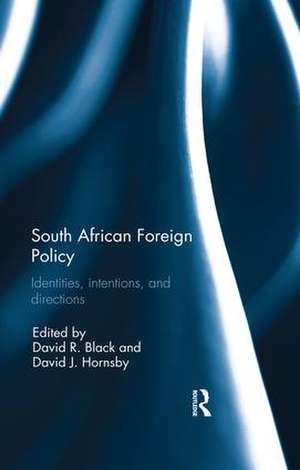South African Foreign Policy: Identities, Intentions, and Directions
Editat de David R. Black, David Hornsbyen Limba Engleză Paperback – 10 ian 2019
This book was previously published as a special issue of Commonwealth & Comparative Politics.
| Toate formatele și edițiile | Preț | Express |
|---|---|---|
| Paperback (1) | 416.22 lei 6-8 săpt. | |
| Taylor & Francis – 10 ian 2019 | 416.22 lei 6-8 săpt. | |
| Hardback (1) | 994.74 lei 6-8 săpt. | |
| Taylor & Francis – 19 oct 2016 | 994.74 lei 6-8 săpt. |
Preț: 416.22 lei
Nou
Puncte Express: 624
Preț estimativ în valută:
79.65€ • 85.17$ • 66.41£
79.65€ • 85.17$ • 66.41£
Carte tipărită la comandă
Livrare economică 17 aprilie-01 mai
Preluare comenzi: 021 569.72.76
Specificații
ISBN-13: 9780367030094
ISBN-10: 0367030098
Pagini: 148
Dimensiuni: 138 x 216 x 8 mm
Greutate: 0.45 kg
Ediția:1
Editura: Taylor & Francis
Colecția Routledge
Locul publicării:Oxford, United Kingdom
ISBN-10: 0367030098
Pagini: 148
Dimensiuni: 138 x 216 x 8 mm
Greutate: 0.45 kg
Ediția:1
Editura: Taylor & Francis
Colecția Routledge
Locul publicării:Oxford, United Kingdom
Public țintă
Postgraduate and UndergraduateCuprins
1. South Africa’s bilateral relationships in the evolving foreign policy of an emerging middle power 2. Norm dynamics and international organisations: South Africa in the African Union and International Criminal Court 3. South Africa and Japan: maintaining a difficult friendship 4. South African foreign policy and China: converging visions, competing interests, contested identities 5. Brazil and South Africa: the ‘odd couple’ of the South Atlantic? 6. A battle of principles: South Africa’s relations with Iran 7. Breaking with tradition? South Africa–UK relations
Notă biografică
David J Hornsby is an Associate Professor of International Relations and the Assistant Dean of Humanities at the University of the Witwatersrand, Johannesburg.
David R Black is the Lester B Pearson Professor of International Development Studies at Dalhousie University in Canada.
David R Black is the Lester B Pearson Professor of International Development Studies at Dalhousie University in Canada.
Recenzii
"With South Africa’s domestic political landscape overshadowing its global affairs at present, the analysis put forward in this volume provides a renewed impetus to the study of South Africa’s foreign policy after 1994."
Sanusha Naidu, Institute for Global Dialogue, South Africa, South African Journal of International Affairs
"The contribution of this book is significant for its focus on bilateral relations, moving beyond much of the literature that has so far focused on South Africa's broader foreign policy development and implementation, particularly in the multilateral system of governance. Given the number of bi-national commisions (BNCs) and strategic partnerships that South Africa has agreed, this is indeed an area that is in the need of further interrogration in terms of its strategic value."
Lesley Master, Strategic Review for Southern Africa, Vol 39, No 2, University of Johannesburg
Sanusha Naidu, Institute for Global Dialogue, South Africa, South African Journal of International Affairs
"The contribution of this book is significant for its focus on bilateral relations, moving beyond much of the literature that has so far focused on South Africa's broader foreign policy development and implementation, particularly in the multilateral system of governance. Given the number of bi-national commisions (BNCs) and strategic partnerships that South Africa has agreed, this is indeed an area that is in the need of further interrogration in terms of its strategic value."
Lesley Master, Strategic Review for Southern Africa, Vol 39, No 2, University of Johannesburg
Descriere
This book considers the identity, direction, and intentions of post-apartheid South African foreign policy. Through an exploration of the nature and trajectory of key bilateral relationships from both the global ‘South’ (Brazil, China, Iran, the AU) and ‘North’ (Japan and the UK), it deepens understanding of the country’s evolving international role.
